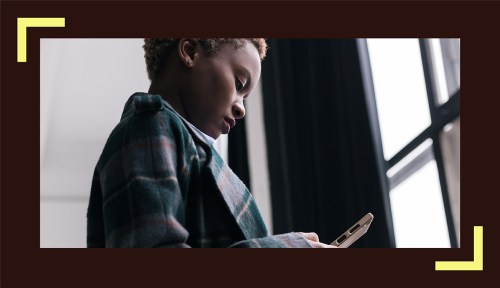‘I’m a Black Woman—Anger Is Part of My Wellness Practice’
Stephanie Kimou, founder of the Anger Africans, discusses how anger feeds her both her work and sense of wellbeing.

I’m an angry Black woman. And as an angry Black woman living in the U.S., I encounter a duality almost daily. I bask in the richness of Blackness and pay homage to my ancestors while navigating experiences like blatant medical racism during my first child’s birth in 2021. I watch Black culture’s growing global influence while being told in a meeting that my “natural hair looks better straight.” Racist comments, sexist assumptions, and moments of feeling erased often send me to bed with anger and wake me up feeling enraged. These are just a few examples illustrating my intersectional experience of being both Black and a woman—and there are many, many more.
Yes, I know, staying angry is bad for my health. If I internalize frustrations and rage, disappointment over an extended period of time, I could be significantly decreasing my lifespan. There’s data to prove it; the American Psychological Association (APA) says that anger is associated with an increased risk of heart disease, hypertension, blood pressure, and other heart-related problems.
“My sense of wellness is deeply rooted in knowing my anger can disrupt violent and oppressive systems.”
Still, there’s a lot to be angry about. The term “weathering” was coined in 1992 by Arline Geronimus, PhD, a researcher from the University of Michigan who studied how weathering impacts Black pregnant people, found that repeated exposure to socioeconomic adversity, political marginalization, racism, and perpetual discrimination can harm one’s health. Black people around the globe are living through daily microaggressions, violence, co-option, erasure, and gaslighting, which according to Dr. Geronimus, “accelerates aging and increases health vulnerability.”
Racism globally makes it very difficult for Black folks to feel well. Still, we continue to seek wellness. This is evident in the growing number of Black mental health organizations, the ever-increasing rate of Black people practicing yoga, the tools created for us, by us, to support Black-centered meditation experiences, and the growing number of Black people embracing veganism.
Despite reaching toward feeling well, anger persists. However, the APA says that anger can be a good thing, as it can motivate you to find solutions to problems, but for people who look like me, that can be very difficult to believe. Black women and gender non-conforming folks, in particular, have been marginalized due to our anger. We have been policed even with the spectrum of inequities we face daily, making it difficult to feel well while being forced to silence what’s hurting.
Anger is a path toward wellness
In my early 20s, when I began redefining my relationship with anger, I turned to trusted literary ancestors for guidance. Audre Lorde’s 1981 keynote presentation at the National Women’s Studies Association Conference reminded me that “anger is full of energy and information…” This taught me that my anger is valid and can help me find solutions.
James Baldwin’s 1961 radio interview taught me, as an angry Black person, “it isn’t only what is happening to you. But it’s what’s happening all around you.” Baldwin’s words helped me understand that racist comments, sexist assumptions, momentary erasures happen to so many people in my community—Black people across the globe have miraculously continued to exist and fight, and we’ve used our anger as fuel for change.
I looked to Lama Rod Owens, a queer, Black Buddhist teacher, and author of Love & Rage, who taught me to hold space for anger, get to know its root cause, identify my hurt, and acknowledge it.
Owens emphasizes that for Black people, in particular, we must turn to our anger and ask: What do you need?” Suddenly, I realized that my anger wasn’t meant to be feared or suppressed. It wanted me to rise to the occasion: I was meant to tell stories of “angry” Black revolutionaries like Angela Davis and Miriam Makeba. My anger wanted me to lift it up and reclaim it—it wanted to be understood through the lens of wellness.
So I did what my anger required. I launched The Angry Africans: A Love Letter to Mad Blacks, a digital platform that celebrates how angry Black people continue to change the world. Being angry can amplify our wellness because it catalyzes change, and I wanted to create a platform that reminded Black people of that truth. Through archives, love letters, and social commentary The Angry Africans is undoing the fallacy that mad Black people are to be feared and erased, when in fact we deserve our flowers for the positive changes we’ve ushered into the world.
Am I still angry? Of course. But, my sense of wellness is deeply rooted in knowing my anger can disrupt violent and oppressive systems. My anger can—and will—create new ways of ensuring Black communities are cared for, seen, heard, and loved.
Oh hi! You look like someone who loves free workouts, discounts for cutting-edge wellness brands, and exclusive Well+Good content. Sign up for Well+, our online community of wellness insiders, and unlock your rewards instantly.
Sign Up for Our Daily Newsletter
Get all the latest in wellness, trends, food, fitness, beauty, and more delivered right to your inbox.
Got it, you've been added to our email list.










